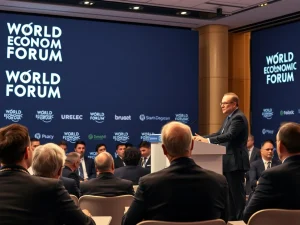Urgent Crypto News: Circle Unveils Arc Blockchain Amidst Key US Regulation Shifts

The cryptocurrency world never stands still. Today, significant developments have reshaped the landscape, offering crucial insights for every investor and enthusiast. From groundbreaking blockchain initiatives to pivotal regulatory shifts, the daily flow of crypto news continues to define the future of digital assets. These events impact everything from Bitcoin’s price movements to the broader adoption of Web3 technologies. Understanding these shifts is vital for navigating the dynamic digital economy.
Circle Arc Blockchain: A New Era for Institutional Crypto
In a groundbreaking move, Circle, the issuer behind the world’s second-largest stablecoin, USDC, officially launched the public testnet for Arc. This open layer-1 blockchain network aims to integrate global financial infrastructure directly on-chain. The rollout, which Circle aptly calls the “Economic Operating System for the internet,” represents a significant leap forward. It promises to bridge traditional finance with the decentralized world.
The participation list for Arc’s testnet is truly impressive. Over 100 major companies are involved, spanning banking, capital markets, and fintech. This list includes industry titans such as BlackRock, Goldman Sachs, Visa, Mastercard, and State Street. Circle CEO Jeremy Allaire highlighted the remarkable early momentum. He noted that these participating companies collectively reach billions of users. Furthermore, they move, exchange, and custody hundreds of trillions in assets and payments annually.
Arc’s design focuses on several key features:
- Predictable US dollar-based fees: Ensures cost stability for transactions.
- Sub-second finality: Allows for near-instant transaction settlement.
- Optional privacy controls: Offers flexibility for institutional requirements.
- Direct integration with USDC: Leverages Circle’s established stablecoin.
This innovative platform aims to support a broad range of financial applications. These include lending, capital markets, global payments, and foreign exchange (FX). The testnet launch has already attracted engagement from other major institutions. These include Apollo, BNY Mellon, Intercontinental Exchange, and Deutsche Bank. Global payment firms like FIS, Paysafe, and Nuvei are also on board. This widespread interest underscores the potential for Arc to revolutionize how financial services operate on a global scale. The integration of such prominent players signals a strong move towards mainstream institutional crypto adoption. This development could fundamentally alter the landscape for digital asset use in traditional financial markets.

US Lawmakers Address Crypto Regulation US: Ethics and Conflicts
Meanwhile, the political sphere saw significant action concerning crypto regulation US. A prominent US lawmaker is pushing for new legislation with far-reaching implications. US Representative Ro Khanna, a Democrat, announced his intention to ban specific individuals from trading cryptocurrencies and stocks. This proposed ban would apply to US President Donald Trump, his family members, and elected government officials. Khanna raised concerns during an MSNBC appearance. He highlighted Trump’s apparent conflict of interest with crypto. This concern stems from his son’s crypto project, World Liberty Financial (WLFI). Khanna further alleged that the recent pardoning of Binance co-founder Changpeng “CZ” Zhao constituted “blatant corruption.”
Rep. Khanna emphasized the need for stricter ethical guidelines. While he did not detail his legislative proposal, his message was clear. He called for a ban on “any elected official from having cryptocurrency and accepting foreign money.” This initiative reflects a growing sentiment in Washington. Lawmakers are increasingly scrutinizing the intersection of personal financial interests and public office, particularly within the nascent crypto sector. Such legislation could dramatically reshape how politicians interact with digital assets. It underscores the ongoing debate about transparency and accountability in government, especially concerning new financial technologies. This legislative push aims to prevent potential abuses of power. It seeks to ensure that public officials act solely in the public’s best interest.

CFTC Nomination Confirmed: A Focus on Crypto Policies
Further shaping the regulatory environment, Michael Selig confirmed his nomination to chair the Commodity Futures Trading Commission (CFTC). This significant development comes as the agency faces a leadership void. The move still requires Senate approval, but it signals a potential shift in the CFTC’s direction. Selig, currently an official with the US Securities and Exchange Commission (SEC), cited a clear focus on crypto policies. His nomination was initially reported and later confirmed by Selig himself and White House crypto and AI czar David Sacks via X posts.
Selig’s confirmation would pave the way for the departure of acting Chair Caroline Pham. He reiterated President Trump’s stated goal of making the US a “crypto capital.” This vision suggests a regulatory approach that could foster innovation while ensuring market integrity. The CFTC nomination occurs amidst a challenging political climate. The US government shutdown, entering its fifth week, has created legislative hurdles. Despite the shutdown, the Senate retains the ability to pass legislation. This includes potentially a digital asset market structure bill. However, lawmakers’ immediate priority remains a continuing resolution to fund the government.
The CFTC has operated with a reduced leadership panel. Since Commissioner Kristin Johnson’s departure in September, Pham has been the sole member of the five-member panel. Her intention to depart after a replacement is confirmed further highlights the urgency of Selig’s approval. The CFTC plays a crucial role in overseeing derivatives markets, including certain crypto derivatives. Therefore, a fully staffed and decisive leadership is essential for clear guidance and effective enforcement in the evolving digital asset space. Selig’s potential leadership could bring much-needed clarity and direction to this critical regulatory body, impacting various aspects of crypto news and market operations.
The Broader Impact on the Crypto Landscape
These three major developments collectively underscore the rapid evolution of the cryptocurrency market. Circle’s Arc blockchain represents a significant push towards integrating digital assets into traditional financial systems. This fosters greater efficiency and accessibility. Meanwhile, the legislative efforts by Representative Khanna highlight growing concerns about ethical conduct and potential conflicts of interest among public officials engaging with crypto. This reflects a broader trend of increased scrutiny from lawmakers.
The impending CFTC nomination of Michael Selig adds another layer of complexity. His appointment could influence the regulatory trajectory for crypto derivatives. It also signals the US government’s intent to solidify its stance on digital assets. Each of these events, while distinct, contributes to a larger narrative. This narrative involves the ongoing maturation of the crypto industry. It also involves the continuous efforts to establish clear regulatory frameworks. These frameworks are essential for both innovation and consumer protection.
Investors and market participants must remain vigilant. They need to monitor these developments closely. The interplay between technological innovation, political will, and regulatory oversight will ultimately shape the future of cryptocurrencies. These recent announcements provide a snapshot of a market in constant flux. They emphasize the need for informed decision-making. The journey towards a fully integrated and regulated digital financial system continues, marked by both exciting advancements and necessary challenges. The path ahead requires careful consideration from all stakeholders. Staying updated with daily crypto news remains paramount for navigating this complex environment.









